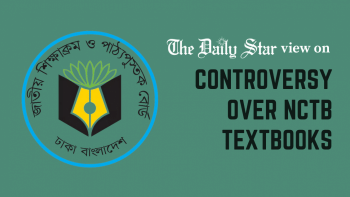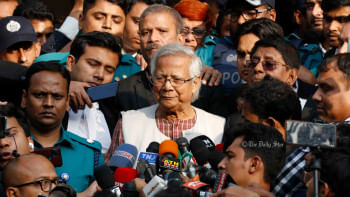Books and bureaucrats are a dangerous mix

Do you feel, whenever the realms of books and bureaucracy converge, that something very non-bibliophilic is about to happen? I do, and my instincts tend to be accurate. After all, it is bureaucracy that is largely responsible for restricting the free flow of ideas and undermining academic freedom in Bangladesh. It is bureaucracy that punishes critical publications. It is bureaucracy that compromises the integrity of school textbooks through undue additions or omissions. It is bureaucracy that has reduced the quest for knowledge to a quest for BCS jobs. It is bureaucracy that has robbed the spirit of our Language Movement by marginalising mother languages – including Bangla. It is because of bureaucracy that once-revered state awards for writers are now objects of ridicule.
I can go on and on about the detrimental effects of bureaucracy on the world of literary endeavours, but you get the point. There is something about the intertwining of paperwork, protocols and politics that can lead to a tragic loss in translation. As grand visions and initiatives about book-related affairs are filtered through layers of bureaucracy, they emerge altered, diluted, or even entirely lost.
Take, for example, the case of Jatiya Grantha Kendro, or National Book Centre. Few people are perhaps aware that there is a specific government institution responsible for overseeing non-government libraries. There can be any number of reasons for its relative lack of familiarity. If I had to guess, I would say it's because this is how those in charge of it want it to be – less known, less scrutinised.
For there is a lot about this institution that, bureaucrats would hope, is better left buried under the rug. As per a recent report by this daily, the centre, since its establishment following the enactment of the National Book Centre Act, 1995, has been consistently failing to fulfil its mandate due to poor infrastructure, a shortage of manpower and resources, and lack of care and planning. There it goes again: the bureaucratic mechanism being an Achilles' heel in literary initiatives. Everything about the centre is thus ill-conceived and poorly executed, ranging from the shabby, largely nondescript building in which it is housed, to its lack of promotional activities, to the way it engages with the recipients of its annual grants.
Its pathetic state is perhaps best reflected in the management of its own library, which has over 11,000 books, including many rare reference materials. However, as the librarian himself admits, there hasn't been a visitor looking for books in years! What is a library for, then? To read newspapers? To play host to BCS crazies? To collect books (and dust)? The disorganised arrangement of the books in this library, with stacks of old newspapers and rare books piled haphazardly in dark corners, would be an eyesore to any bibliophile. The authorities couldn't archive them systematically, let alone digitise them, even after 28 years of its establishment.
It was only in 2018 that the government started to observe the National Library Day, on February 5. Given how the day is observed – through issuing a circular, some discussion, maybe a procession if someone is feeling outdoorsy – you cannot help but see "perfunctory" written all over it.
In addition to the poor management of its library, the centre is also being hamstrung by various problems in its handling of non-government libraries. For one, the financial assistance given to the listed libraries is woefully insufficient. The annual allocations – divided into categories A, B, and C – barely cover a couple of months' operational costs for them, leaving them financially strained. The bureaucratic hurdles involved in accessing the funds further compound their difficulties. There are also allegations of favouritism and lack of quality control when it comes to giving them books. Often, substandard books on political and administrative issues, written by ruling party leaders and bureaucrats, dominate the offerings, while books of diverse genres and perspectives are ignored. We have seen the same thing happening in August 2022 when a book reading programme for government officials included over a hundred books written by 25 high officials. Why select books that no one in the four hemispheres would want to read?
All this is quite hard to accept because the National Book Centre could be a vital player in building a strong library culture in the country, as is its mandate. Private libraries, built through voluntary initiatives all over the country, give us hope amid the deteriorating state of most public libraries. They have challenges of their own, of course, especially in terms of finances, quality of services and book collection. In this digital era, they also suffer from the prevailing apathy towards books. But their very existence is a defiant counterpoint to this situation. And with proper assistance and guidance, they could be moulded into genuine drivers of change in local communities.
Although any private initiative must ultimately depend on its own strength for survival, government oversight, and grants, if properly distributed and followed up on, can help in a big way. Such assistance must be provided with a genuine interest in promoting a culture of reading and intellectual engagement among people, especially the younger generation. This interest is precisely what is lacking now. It was only in 2018 that the government started to observe the National Library Day, on February 5. Given how the day is observed – through issuing a circular, some discussion, maybe a procession if someone is feeling outdoorsy – you cannot help but see "perfunctory" written all over it. It almost seems as if bureaucrats merely wanted to tick a box. It makes them look good, and feel useful, except it is of no use in a practical sense. No change to our troubled interaction with books was sought, none achieved.
Why should we read? Because books – the right kind of books – can educate, inspire, and transform. It is not for nothing that the pen is believed to be mightier than the sword. But don't expect much when bureaucrats wield their pens to shape the destiny of literary initiatives. Their ability to complicate the simplest of decisions, their blunders and misplaced priorities, and their interest in preserving the prevailing politico-administrative status quo can derail even the noblest of efforts. A reader-friendly environment that helps to think and critically engage is not in their best interest.
Badiuzzaman Bay is assistant editor at The Daily Star.

 For all latest news, follow The Daily Star's Google News channel.
For all latest news, follow The Daily Star's Google News channel. 






Comments